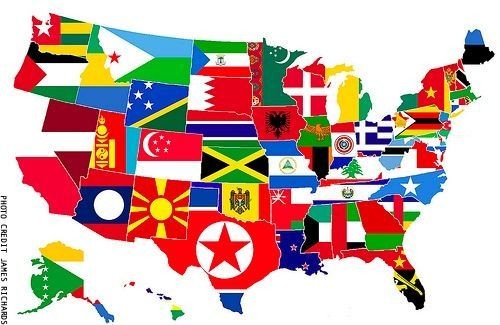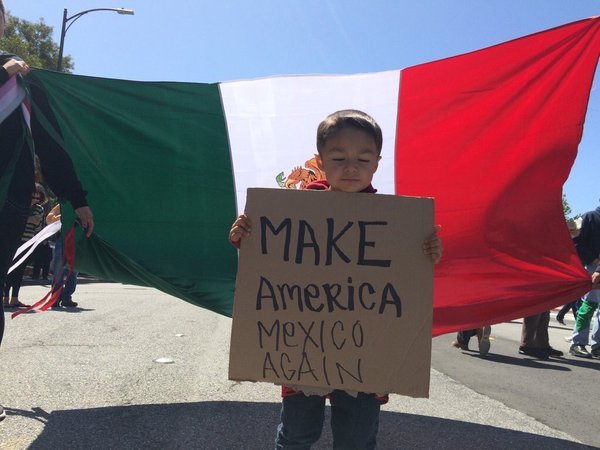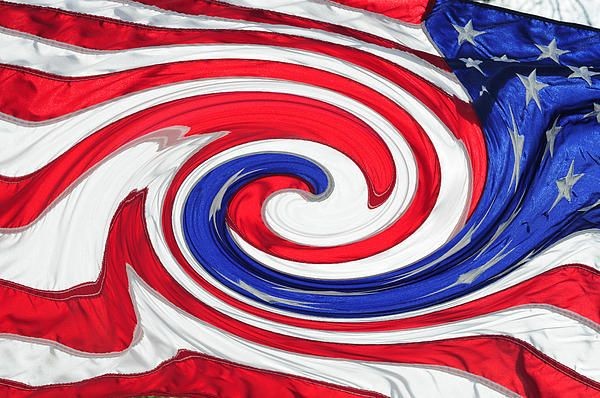I’ve been thinking about this evergreen topic for a while and didn’t want to release it until I was content with the research. Now seems as good a time as any to release it, particularly with the potential of a war with Iran on the horizon and the inevitable uptick on military ads to propagandize people to enlist to protect their “nation.” People on the Dissident Right have already commented on how ridiculous this is on the surface: as the government actively undermines and demographically replaces white people, those very same white people are encouraged to risk their life for the “rights” of people in foreign countries.
Rather than deal with the absurdity of such fighting, this article is to focus on the other issue of war. Many have said war is a unifying force and that Americans never have been more unified as a nation than after September 11. This view is troubling, not simply because the tone of such arguments seemingly advocates more terrorism, but also because America is not now, nor ever truly was, a “nation.”
The most succinct definition I can find of “nation” is in the Oxford Dictionary which defines a nation as “a large body of people united by common descent, history, culture, or language, inhabiting a particular state or territory.” The first “or” implies that a nation can be unified by one or more of these individual components. Interestingly, the definition of “nation” is almost the same as the definition for ethnic group.
When I use the term “American” I mean everyone with American citizenship. This is for two main reasons. The first is because a foreign population residing within a country is not rightly included within a “nation.” The Helots were not Spartans, black slaves were not Southerners, Turks squatting in Düsseldorf are not Germans and migrants or expatriates (who make up the bulk of the population) are not Emirates. The second is because all American citizens have the same rights and claim the legal protection and “identity” of “American.” If people believe that John, Juan, and Jahmal are actually red-blooded Americans, then there needs to be something that unites them by common descent, history, culture, or language.
Common Descent
There are two main definitions for common descent; the first is biological and the second is through parallel family histories (which fits more under the “history” part of the “nation” definition). The biological definition cannot work for America for obvious reasons. There is firstly the racial issue – the common ancestor for an African-American and a White American is more distant than between a White American and a European or an African American and people from African nations, so clearly that cannot be a unifying link between “Americans.” This is even an issue for White American Nationalists.
Most of the founding stock of America were of British ancestry and you can certainly argue that while Irish, Scots, Welsh, and English people are genetically distinct, a new ethnic group could emerge by their coming at the same time and mixing so that their descendants would have common descent. If there had been a complete closure of immigration, then an American would likely have a genetic makeup that is 75% Celto-British and 25% Continental. This did happen for the British, as the Angles and Saxons mixed with the Celts to form the modern English.
An ethnogenesis like what happened for the British did not happen in America because America was an ever-expanding country, both territorially and in population, as successive waves of immigrants came to America and as the American government took lands filled with colonists from other European powers. This population admixture expanded and diluted the gene-pool, preventing the process of ethnogenesis from occurring, except potentially in regions without much immigration or emigration. The best data I could find indicates immigrants made up roughly 10% of the population from 1850 onward to the 1930s (with this immigration primarily being European), dropping to 7% in the 1950s, and then rising after that. Other countries do have large immigrant populations, the UAE being a prime example, but those immigrant populations don’t commonly marry into the main population (and even if they do, they’re marrying into a main population that has common descent, whereas America never formed one).

History
Before looking at America unified by common history, it might be a good idea to find an example elsewhere where there is not common descent, but there is common history. Switzerland is probably the best example of this, as the Swiss don’t have the same religion or language, but they have common heroes like William Tell and are unified by their resistance of other European powers. Aside from Switzerland, which one could argue is more of a bunch of tiny nations that banded together, there doesn’t seem to be a real example of a nation unified by common history that isn’t also unified by common descent. Many European countries have large minority populations due in large part to the changing borders from European wars, so these groups do share a common history to these lands. However, the people seem to view themselves as a people apart, creating minority parties like the National Self-Government of Germans in Hungary or the Moravané Party of Czech Republic.
Aspects of early America are reminiscent of Switzerland: a confederation (later a federation) of independent polities which banded together for mutual defense. However, this common history argument is hard to make for the same reason why the common descent argument is hard to make. According to Reuters, 13.7% of American citizens today are foreign born. It’s hard to say we’re unified by common history when one out of every ten American is from a different foreign land. This unity of history is even more dubious when these immigrants wave flags from their foreign homelands and identify primarily with their origin nation.
Culture and Language
Culture is what civic nationalists advocate most vocally but is the hardest to pin down. When people speak of American values, or any nation’s values for that matter, what do they mean? When pressed on “what are American values” or “what is American culture,” the answers always amount to vague things many nations already embrace (free markets being the one most common in the GOP), surface stereotypes (apple pie or baseball, both of which are enjoyed in other countries), or simply statements that are untrue. Some may argue America is a “Christian and capitalistic country” but only 70% of Americans identify as some type of Christian, so does that mean 30% of American citizens aren’t actually American? One of the inherent issues with civic nationalism is it rests on abstract universal beliefs within the country, but isn’t clear about what to do with citizens who live here but, most importantly, don’t adhere to “our values.”
Looking at the philosophy of the Democrat Party, you’d be hard pressed to say they’re capitalists. In fact, the opposite is growing more true: our culture is becoming socialistic, which means that Paul Ryan and the GOP are really not sharing “our values” with the rest of the country (with somewhere between 44% and 70% of millennials favoring socialism). An ardent anti-communist, pro-gun Christian and a liberal, socialist, anti-gun atheist have no shared values as “Americans.” There is nothing shared between an ardent Democrat and ardent Republican that isn’t shared by all people the world over, which means there is no “shared values” that can be used to delineate “Americans.” If it is a universal value like, “we want our children to have a better life than we had” then that’s not “American” and “America” has no unique values.

Regarding language, other nations certainly were unified by language: Italian unification combined multiple groups together who had been divided politically, but all spoke Italian and were almost uniformly Catholic (and there is debate about common descent, given the difference in appearance between Sicilians and Northern Italians). Similarly, the Germans unified under the Kaiser were all unified by language. In America, there’s been a longstanding issue of many people coming to America and not speaking, or even ever learning, English. Tomi Lahren was recently called out because her ancestors were German immigrants who never learned the language. Even today, 22% of “Americans” don’t speak English at home and this number has apparently doubled since 1980.
Inhabiting a Particular State or Territory
“Americans” do inhabit a particular state or territory, but are not unified by any of the traits necessary to be a nation. There is no common descent, history, culture, or language that unites us.
For some reason, many people believe America is magic and people who move to America will automatically adopt the values (the very same values which Americans are not even unified on anymore). Of course, no one pretends that if you move to China you become Chinese, but America is different…for reasons. Even though American culture was established by British immigrants and was quite distinct from the French or Spanish colonies in the New World, we pretend that changing the population now will not change the culture. The reality is if you import a bunch of Mexicans, you get Mexico. If you import a bunch of Scandinavians, you get Scandinavia (which is largely how the Midwest operates). If you import a bunch of Anglos, you’ll get England. The English who moved to America didn’t adopt Native American culture nor did those who moved to Australia become Aborigines. If you import people from a country, your country begins to look more like that country. It’s not complicated. It’s common sense.
All of these issues go to a question Tucker Carlson asked: “Why should a country with no shared language, ethnicity, religion, culture, or history remain a country?” Some may want to point out that there will always be people on the fringes, and that’s certainly true. But, there is a fundamental difference between a country, that is generally unified and has a small minority, versus a country that has no clear ethnic group, no clear culture, and nothing that unifies the people except for a passport, credit card and a semi-porous border. The issue is that when there is nothing substantial driving the national identity, a nation does not exist. A country that is 90% Italian and 10% “other” can be a nation. A country that is 10% British, 10% Jewish, 10% Arab, 10% African, 10% Hispanic, 10% Hindu, 10% American Indian, 10% Southeast Asian, and 20% mystery meat isn’t a nation. It’s a battlefield.
-By Ethan the Autiste

O I’m a good old rebel, now that’s just what I am. For this “fair land of freedom” I do not care at all. I’m glad I fit against it, I only wish we’d won, And I don’t want no pardon for anything I done.






Nice article and argument. Looking forward to part two.
The South had almost no immigration from the revolution to the 20th century , so ethnogenesis could arguably have occurred on some scale, but this would be a minority population today.
A simple common history would not be enough in my opinion. Consider the South and the North, our histories are pretty much in common but diametrically opposed implying two distinct nations.
I think in the end its perception. If people perceive themselves as a nation they’ll act like one. I think we’re seeing that perception unravel as the number of obviously “not us” increases faster than can be absorbed into the perception.
Water and sanitation, that is what separates true Americans from nü-Americans. Their unique and robust customs included delirium and near fatal/fatal sepsis caused by dysentery, e. Coli, giardia, cholera, typhus etc etc. The diverse poop borne illnesses.
I kid you not, the last time I was up in Breckenridge Colorado I heard some haji speaking Arabic. Not Farsi, Dari, or Pashto, but Arabic in a small charming ski-town in the heart of the Colorado Rockies. The SJW bleeding hearts love to say racism is based on ignorance, but I’m fairly certain they don’t spend much time circulating amongst the diversity they worship.
In America you turn a faucet and clean clear water comes out – unless you live in a majority black municipality. You sit your ass on a toilet and after wiping your ass with toilet paper (or a bidet) you flush the waste into a sewer system or septic tank which goes to a waste treatment facility. You flip a light switch and a smooth and balanced electrical current powers lights that don’t flicker.
America is a functional country due to heroic white male intervention. White females are integral to this process of being attractive and pleasant in order to produce more white males. Less white males means greater civilizational entropy and the long slow slide back to shitting in a hole in the ground, or street, or some murky and brackish stream.